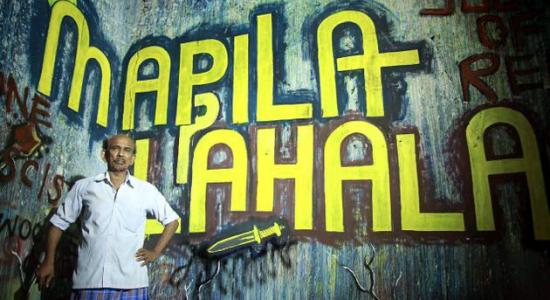Mappilas too Hop from their Hips
 We’ve quoted Sami Alim, hip-hop historian to explain the word hip-hop, you can read the article here, click.
We’ve quoted Sami Alim, hip-hop historian to explain the word hip-hop, you can read the article here, click.
“In hip-hop, personal and political memories converge and the most vociferous (which in the hip-hop glossary is a positive adjective) hip-hop expression, or any cultural expression for that matter, comes out of the most traumatic memory one has. In Black America, there is the collective memory of racism; in Palestine, there is the memory of an implanted power dispossessing people of the land of their very existence; in Tahrir Sqaure, there is the memory (albeit colorful) of people confronting the mighty power that be with nothing but determination. There is always the hip (meaning current in Afro-American English) of political memories from which the singer hops with her throat filled with cries.”
Hip is the intense political memory from which we can’t escape. We can only give vent to the anger which the memory generates. We hope by hopping, ie by singing aloud to the deaf ears.
Given this, it can be said that there has never been a hip-hop musical band in Kerala. Kerala is a south Indian state noted for calmness and ease, which has won the state the accolade: God’s Own Country. But beyond tourism brochures, there is Kerala not yet chronicled. The torrent of Islamophobia which has lashed across the globe has soaked the state, where it exists alongside Dalitophobia. As everywhere, the Muslim community in the state has been placed on the point of suspicion.
This exists despite the empowerment Muslims have achieved compared to their co-believers in other parts of the country, especially the political empowerment achieved by the Indian Union Muslim League. Many Muslims from the state have been arrested illegally under terrorism related charges. There was the death of Muslim youths from the state in fake encounter. Abdul Nasir Maudany, a politician and religious leader, is being imprisoned for his alleged involvement in a blast, the arrest happening after he was exonerated in another blast case for which he had lost about a decade in prison.
All these events were hips for Muhsin Perari, when he hopped with the first musical album ‘Native Bapa” (Mappila Mutiny) under the band ‘Mappila Lahala.’ The theme of the album is centred around the statement of a mother in the northern part of the state, whose son was killed in the fake encounter. She said, on hearing the death of her son, ‘I don’t want to see the body of my son, if he is a terrorist.’ The album makes us think how the state and its machinery can put into our mouth the very words which we never want to believe are true.
The video of the album has been uploaded on the Youtube http://www.youtube.com/watch?v=opnMreZoRyQ which has, in less than a week, has a viewership of about 45,784 people. Also it has attracted rousing response and reviews. The album casts ace Mappila filmmaker Mamukoya, rapper Haris. The music was rendered by Roy George on the lyrics penned by Muhsin. Jijo Abraham is the cinematographer of the video album, edited by Jayasankar.
The very name of the band ‘Mappila Lahala’ is remarkable, resonate as it is with the 1921 Mappila Revolt, in which Muslim farmers in the northern part of the state (who are called Mappilas) revolted against the British administration and the feudal landlords. As the British historians and their imitators among native historians downgraded the Indian Rebellion of 1857 as sepoy mutiny, the Mappila rebellion was belittled as Muppila mutiny in some of the historical documents. The band evokes many images, especially the one of mainstream suspicion against people who are already disenfranchised (the much celebrated Muslim empowerment has not tricked down to millions of poor people, as stated by the report of Sachar Commission, which was constituted by the Government of India in 2005 to study the backwardness of communities, including Muslims).
While launching the band on 31st December 2012, Muhsin expressed his desire to come up with more albums under the band. We also hope so. That is what hip-hop means, isn’t it?






















Connect
Connect with us on the following social media platforms.